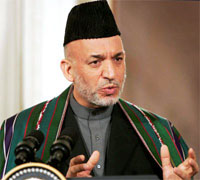Karzai calls for removal of some Taliban names from UN blacklist
 Kabul - Some Afghan insurgent leaders who are not part of the al-Qaeda network should be removed from a United Nations blacklist so as to boost reconciliation efforts with the Taliban, Afghan President Hamid Karzai said Saturday.
Kabul - Some Afghan insurgent leaders who are not part of the al-Qaeda network should be removed from a United Nations blacklist so as to boost reconciliation efforts with the Taliban, Afghan President Hamid Karzai said Saturday.
Speaking to reporters in a press conference at his presidential palace, Karzai also said that his government and the international community must seek the assistance of some Islamic countries in order to accelerate the peace process with the militants.
"While we are speaking about the peace process with the Taliban, we must also make sure to provide the right environment for such a peace process," the president said.
"The right environment means first of all looking at the list of the United Nations and removing the names that are not part of al- Qaeda, that are not part of terrorist network."
He said some of the Taliban on the UN blacklist had simply joined the insurgency because they were afraid of arrest by the Afghan government or international forces, or "are just there because somebody decided to put them in, so those names must be removed from the list."
Karzai's call for accelerating efforts to reach out to the Taliban comes a day after US President Barack Obama unveiled a new strategy for Afghanistan and Pakistan, which includes reconciliation with moderate Taliban insurgents.
While Obama on Friday insisted that the US goal was to "to disrupt, dismantle and defeat al-Qaeda in Pakistan and Afghanistan," he also said that his country was prepared to open centres in different provinces of Afghanistan in order to speed up the peace process with some Taliban elements.
Obama launched a strategic review of the situation in Afghanistan shortly after taking office in January, and has pledged to shift US resources out of Iraq and into the conflict with the Taliban.
Obama's new plan also includes an additional 4,000 US troops on top of the 17,000 already en route to the country this year. With new forces, the US will have a force of nearly 60,000 in the country. More than 30,000 forces, deployed from 41 nations, are also stationed in Afghanistan.
Taliban militants, who have gained power and extended their writ to larger swathes of the country in the past three years following their ouster in late 2001, have rejected peace talks with the Western-backed Afghan government in the past.
On Friday, the insurgent spokesman, Zabiullah Mujahid said that the Taliban movement would continue with its insurgency until the international forces are "defeated and expelled" from the country.
During his Saturday media briefing, Karzai welcomed Obama's new strategy for Afghanistan and said that the new US plan was "better than expected" because it reflected the demands of Afghan people.
Recognition of the war on terrorism as a regional problem and a focus on strengthening the Afghan government and its security forces have both been long-standing requests by the Afghan people, Karzai said.
The president also said that the assistance of some Islamic countries, including Saudi Arabia and Pakistan, which were close to the Taliban during its 1996-2001 regime, was vital in striving for peace in his war-torn country.
Saudi Arabia, along with Pakistan and the United Arab Emirates, were the only states to recognize the Taliban regime when it ruled Afghanistan. These governments are still believed to have leverage on the militants' movement because of their ties with Taliban leaders.
"The help of countries who have an important role in this regard must be asked for," Karzai said, adding, "So all those elements have to be put together." (dpa)